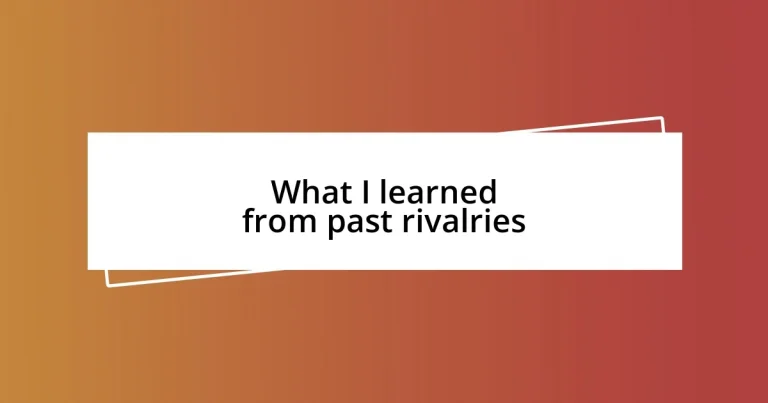Key takeaways:
- Rivalries can drive personal growth by reflecting our struggles and inspiring resilience through competition.
- Effective strategies to handle competition include collaboration over confrontation, emotional intelligence, and regular self-assessment.
- Transforming rivalries into opportunities fosters innovation and can enhance professional relationships, turning competition into a motivational force.
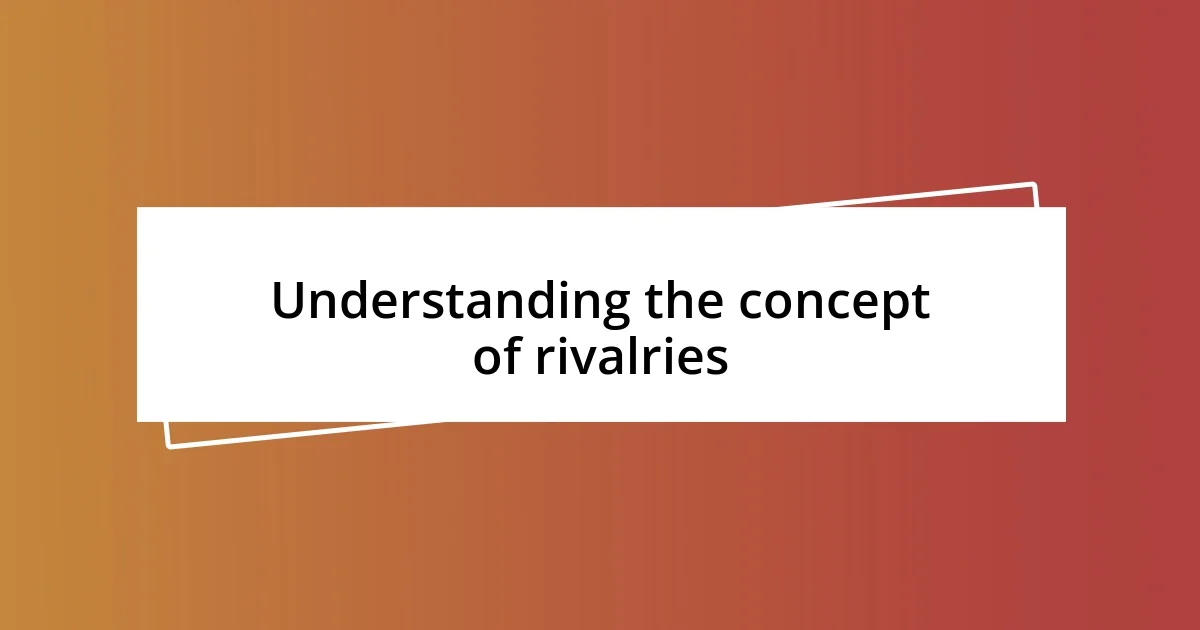
Understanding the concept of rivalries
Rivalries often emerge from a mix of competition and passion, grounded in shared history. I remember watching fierce matches between my favorite teams, feeling that rush of adrenaline as rival players exchanged barbs and celebrated victories. It made me realize—what is it about these rivalries that fuels our emotions and keeps us glued to the drama unfolding?
On a deeper level, rivalries can be a mirror reflecting our own struggles and aspirations. I once found myself rooting against a team that reminded me of my past failures in sports. Was it jealousy, or perhaps a desire to overcome those very challenges? This made me ponder: do rivalries push us to improve ourselves, or do they simply spotlight our insecurities?
It’s intriguing how rivalries often transcend sports and seep into various aspects of life—business, politics, even personal relationships. One time, during a group project, I felt the tension rise when two members clashed over ideas. Instead of tearing us apart, that rivalry actually sparked creativity and innovation. How ironic is it that conflict, when approached correctly, can lead to growth and collaboration?
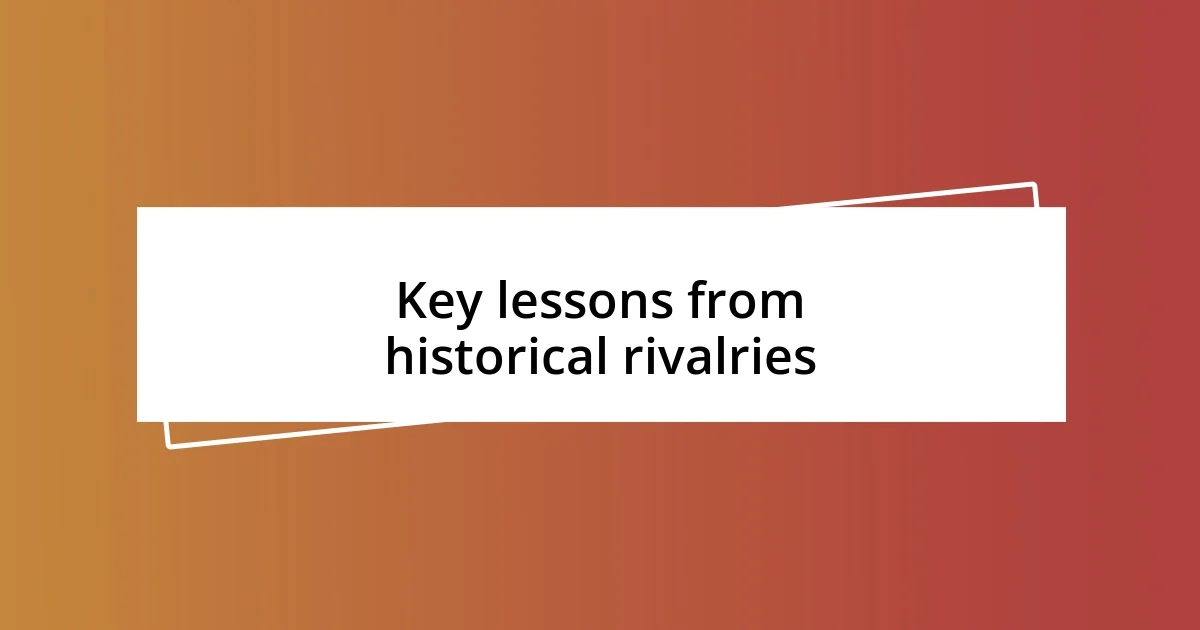
Key lessons from historical rivalries
Absolutely! Here are two paragraphs that delve into the key lessons from historical rivalries, each with its own style and length.
Rivalries teach us the power of resilience. I once watched a documentary about a historic sports rivalry where one team suffered repeated defeats but came back stronger each season. Their passion and determination resonated with me, reminding me of how I felt during my own struggles in trying out for the school play. The lesson was clear: setbacks can be powerful motivators, fueling a relentless pursuit of improvement.
Reflecting on historical rivalries, I see several key takeaways:
- Perspective on competition: Rivalries provide a lens through which we can examine our own ambitions.
- Innovative thinking: Conflict can yield unexpected ideas, much like how rival businesses push each other to innovate.
- Leadership lessons: Observing how leaders handle rivalries can reveal strategies for managing tensions effectively.
Each lesson from the past emphasizes how competition can shape character and drive growth, both on and off the field.
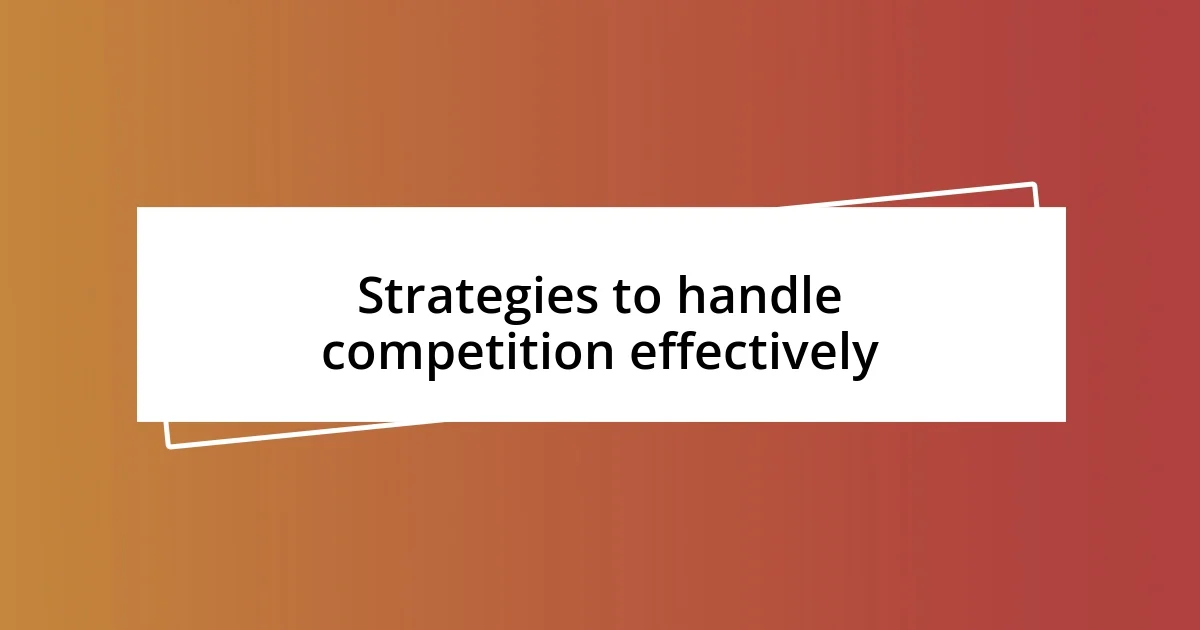
Strategies to handle competition effectively
Handling competition effectively requires a strategic mindset. One approach I’ve found beneficial is to focus on collaboration instead of confrontation. For instance, during a competitive sales period, I noticed how sharing insights with a rival team prompted both sides to elevate their performance. Instead of viewing each other as threats, we became partners in progress, which I truly believe made our performance stronger overall.
Another valuable strategy is to practice emotional intelligence. I remember a time when I felt frustrated watching a competitor outpace my team. Instead of sulking, I took a step back and analyzed their strategy. This reflection helped me identify areas for improvement within my own approach. Recognizing and managing emotions transformed my perspective on competition from one of envy to inspiration, shifting the focus to self-improvement.
Regular self-assessment is also crucial. I’ve learned that examining my strengths and weaknesses in relation to competitors can pave the way for innovative strategies. For instance, after losing a key match, I sat down to analyze what went wrong. This not only honed my skills but also helped me develop new tactics, turning a loss into a stepping stone for future victories.
| Strategies | Description |
|---|---|
| Collaboration Over Confrontation | Viewing competition as an opportunity to learn from one another rather than a battleground can lead to shared success. |
| Emotional Intelligence | Understanding and managing emotions can transform competition into motivation and growth. |
| Regular Self-Assessment | Analyzing personal strengths and weaknesses in the face of competition helps identify areas for improvement. |
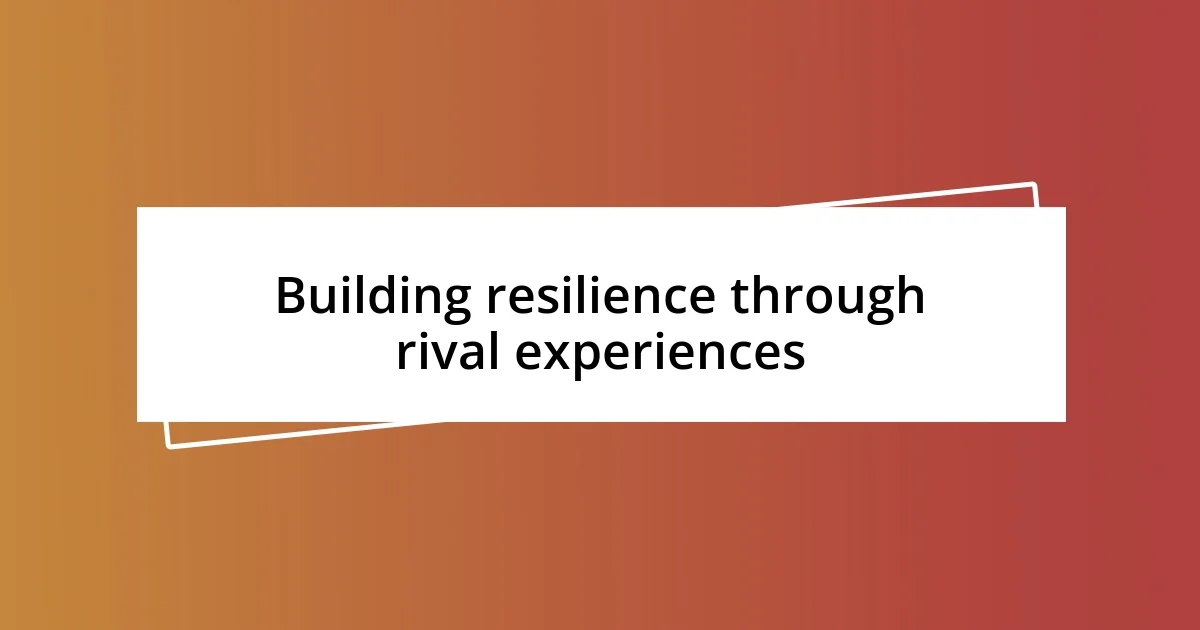
Building resilience through rival experiences
Building resilience through rival experiences is an incredibly transformative process. I remember a particularly challenging time when I was part of a debate team. We had a fierce rivalry with another school, and I felt the weight of the competition, but this pressure ignited a fire within me. Instead of crumbling, I channeled that stress into honing my public speaking skills. That experience taught me that rivalries can be powerful catalysts for personal growth, pushing us to overcome obstacles we might not have faced otherwise.
Sometimes, I wonder what exactly makes us resilient. Is it our willingness to face challenges head-on? For me, it was the realization that the struggles I faced with my rivals offered valuable lessons. Each debate and each loss forced me to analyze my arguments and presentation style. This reflective practice not only made me a better debater but also instilled a sense of confidence that I could bounce back from setback after setback. The resilience I built in those moments has served me well beyond the debate stage.
Rival experiences often help to build a mental toolkit that we can rely on later in life. When I encountered difficult situations at work, I drew upon the strategies I learned during that rivalry. Those moments of competition taught me to embrace adversity, developing a mindset that views challenges as opportunities for growth. It’s incredible how those formative experiences shape our ability to tackle future hardships, reminding us that resilience isn’t just about enduring; it’s about thriving in spite of challenges.
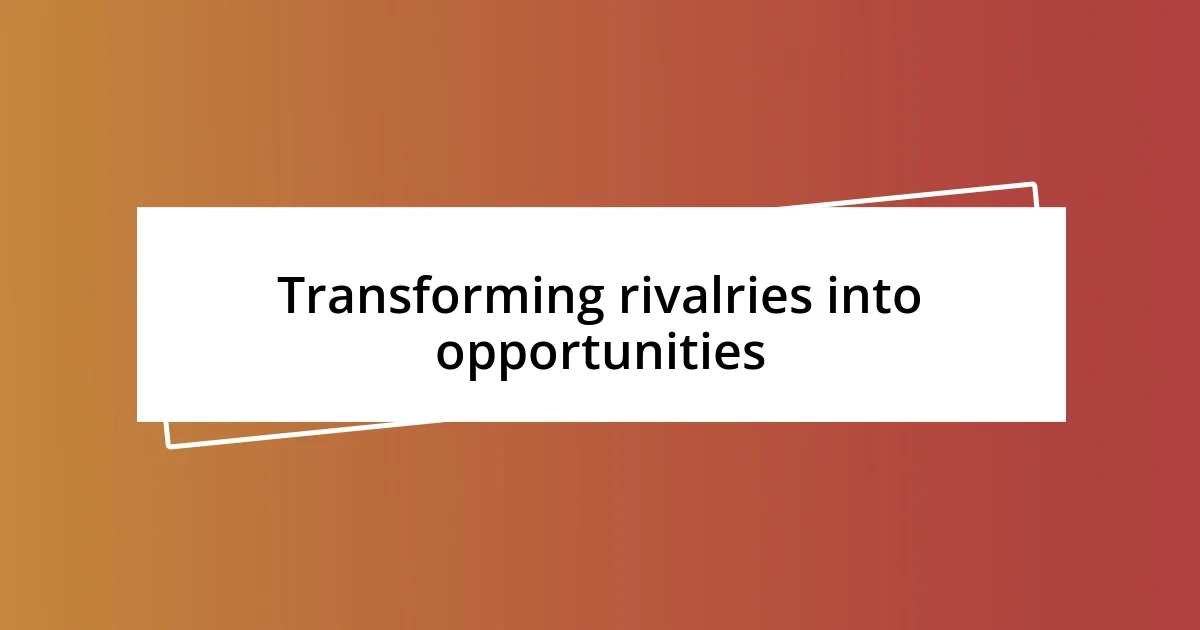
Transforming rivalries into opportunities
Transforming rivalries into opportunities can feel counterintuitive at first. I remember a time when a rival’s aggressive marketing tactics made me question my every move. Instead of seeing them solely as a threat, I decided to analyze what they were doing right. This led me to experiment with new marketing strategies of my own, ultimately resulting in a fresh perspective that invigorated my approach. It’s fascinating how sometimes, the very competition that makes us uncomfortable can also inspire innovation.
In another instance, I found myself in a professional environment where my competitor and I were vying for the same promotion. Initially, I viewed that rivalry as a hurdle. Yet, I realized it presented an opportunity to connect with my rival on a deeper level. Instead of sabotaging each other, we started sharing insights and discussing our respective aspirations. This collaboration not only improved our working relationship but also amplified our performance, showing me that competition doesn’t have to mean opposition.
As I reflect on these experiences, I often ask myself: How can we harness the lessons from our competitors to fuel our growth? In my case, each rivalry uncovered unique learning moments. By acknowledging what others do well, I found areas I could improve. This shift in mindset transformed my view of competition into a motivational force that fuels my professional journey, proving that rivalries can indeed be powerful avenues for opportunity if we allow them to be.












